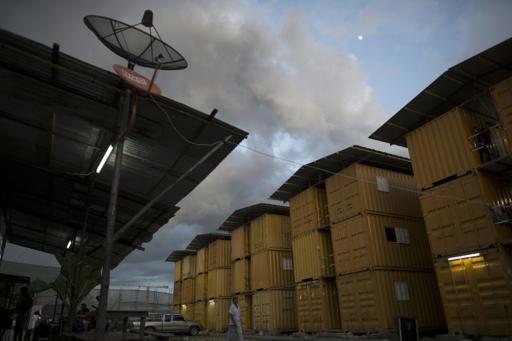The village sprang up in a matter of days -- neat lines of bright yellow houses that looked like something a child might have built with Lego bricks.
This eye-catching complex on the outskirts of Bangkok is unlikely to win any architectural awards.
But for the hundreds of migrants who live there it is an unusually neat home in a country where poorly paid foreign workers all too often toil in harsh conditions.
The village is made out of refurbished shipping containers, stacked three blocks high and connected by a series of walkways and ladders.
Over the next three years its 800 or so inhabitants will construct one of the many luxury condo blocks that add to the Thai capital's ever-shifting skyline.
Standing amid piles of bags and boxes as she prepares to move into her container, 28-year old Cambodian national Duan is upbeat, despite having momentarily mislaid her television.
"Life here is better," she tells AFP. "Living in Cambodia was good but I couldn't earn as much money."
Duan is one of an estimated four million foreign migrant workers who have flocked to Thailand in search of higher wages, often in the kind of low-paid, physically demanding and sometimes dangerous industries that comparatively wealthy Thais now have little appetite for.
The vast majority of these workers, many of whom are undocumented, hail from Myanmar, Cambodia and Laos and work inside the construction, agriculture, fishing and manufacturing industries.
Without them Thailand's economy would grind to a halt.
Jobs no-one else will do
"Migrant labourers are now working in areas where Thais no longer wish to work," explains Jeff Labovitz, chief of mission in Thailand for the International Organization for Migration (IOM).
"They're more dangerous than other jobs, the conditions are not necessarily as good and the pay is not necessarily as high. But for those people coming to Thailand, it's much higher and much better than it is in their home country," he adds.
Strumming a guitar inside his shipping container home, Dam, 30, is typical of those who oil the lower rungs of Thailand's economy.
As a welder he earns 400 baht ($11) a day, almost three times the average daily wage in his native Laos.
And because his accommodation is already paid for by the construction company, most of that money goes home to his family of rice farmers.
"I do not really suffer here. I have fun in Bangkok... I just live my life freely," he says.
To say Dam and his fellow construction workers have it easy would be an overstatement.
Their accommodation is spartan, not to mention sweltering in a country where even nighttime temperatures rarely dip below 30C (86F) for much of the year.
While the container homes boast electricity, they don't have running water and bathing takes place communally, with thin sarongs to protect female modesty.
Each 12m-long container is divided into four sections, with some housing an entire family of four.
Abuses commonplace
But others have it much worse. Rights groups have long documented exploitative and dangerous conditions for Thailand's migrant workers.
It is not uncommon to see migrants jammed into pick-up trucks being ferried across Thai towns, sleeping in makeshift huts and bathing their children by the roadside after a long day of work.
Max Tunon, a regional official at the International Labour Organization, says inspectors can only check on working conditions if it is included in an employee's contract.
"Even if inspectors do gain access, they are limited to only giving advice on how to improve conditions, but cannot make orders on living conditions," he adds.
Sexual harassment in communal bathing areas, he adds, is a "specific problem" the ILO is investigating.
Earlier this year the European Union threatened to blacklist Thailand's fishing industry, partially because of conditions faced by migrant workers on board vessels.
The United States also placed the kingdom on the bottom tier of its human trafficking index for the second year running.
Those who blow the whistle are rarely greeted as heroes.
Thailand-based British rights activist Andy Hall is facing both civil and criminal defamation proceedings over a recent report he co-authored exposing rights abuses in the country's lucrative fruit picking industry.
The cases are being brought by one of the exposed fruit companies as well as Thailand's Attorney General.
As sun sets on the container village, the stony ground outside becomes an impromptu village square with groups grilling fish and playing volleyball.
Most of the workers will be up at 5.30 am the following day. And once the condo block is built, the container village will be moved to the next construction project.






















































